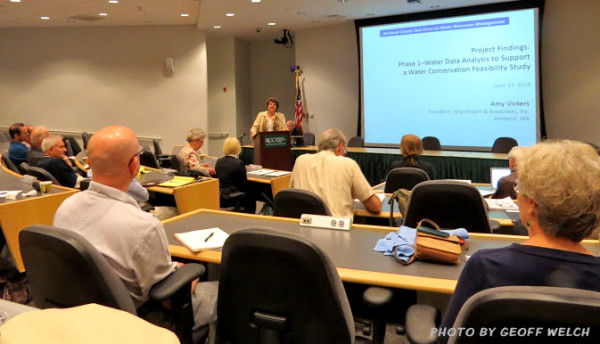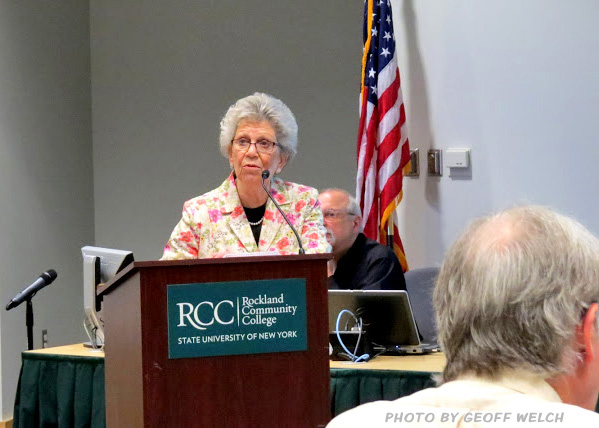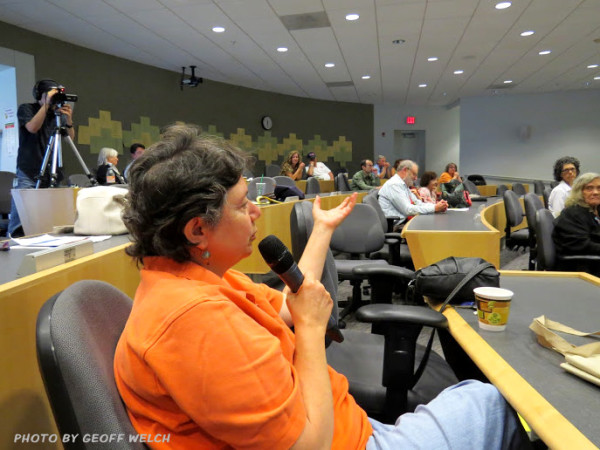
Amy Vickers presents her analysis of water use in Rockland County at a public meeting held by the Rockland County Water Task Force.
While United Water New York presses forward to raise water rates some $49 million dollars, impacting every customer in Rockland County, a new report by water conservation and efficiency expert Amy Vickers indicated there’s no shortage of Rockland water, given a measurable “15%-25% untapped capacity within UWNY system.”
United Water New York has filed with the Public Service Commission seeking up to $49 million in “surplus charges” for its failed desalination Haverstraw Bay plant, with much of those charges expected to be passed on to Rockland County water customers in increased rates and fees.
Vickers presented her findings last week at the Rockland Task Force on Water Resources Management open public meeting in RCC’s Technology Building — a key component of Vickers’ study focused on the amount of water leakage in the UWNY system.

Rockland Legislator Harriet Cornell Chairs the Task Force on Water Resources Management which sponored a recent public presentation of county water use that showed data used by UWNY for it Haverstraw Bay desalination bid was flawed.
United Water is in the midst of a bid to gain approval for a massive Haverstraw desalination plant that could still soak Rockland customers — UWNY has applied to the Pubic Service Commission to recoup $49 million dollars the company invested in the project via surplus charges.
United Water, a subsidiary of French conglomerate Suez, made the Haverstraw Bay desalination project a priority as the lead source of a New York state mandate that the company develop new water sources to meet future customer demands. During Public Hearings for the project, findings presented by opponents of the project determined that Rockland’s water needs could be met through UWNY production upgrades and conservation strategies, without the huge investment in a desal plant tapping into Haverstraw Bay and the Hudson River.

An audience member probes Amy Vickers on her recent Rockland County water use analysis. A water conservation and efficiency expert, Vickers found that UWNY experiences from 15% to 25% water leakage from throughout its system.
Vickers’ appearance at the Task Force was the first public presentation of her Phase 1 comprehensive analysis of water use in Rockland County. Results of the study indicated that UWNY data used to support its desal project was flawed — including frequent United Water data inconsistencies, errors and missing data, and records sent to DEC, PSC and other agencies.
One finding showed that even though Rockland population has grown since 2000, water use itself has flattened. Finding number five showed UWNY repair and replacement of water mains throughout the system was “moving at a snail’s pace”
“I was just shocked when i looked at the length of pipe being replaced,” said Vickers during her presentation, citing 2014 project data that showed only 1.5 miles of UWNY main replacement in a 1050 mile system.
“You’re on a 704 year schedule,” said Vickers, referring to the pace of main replacement.
The PSC will take public comments until July 6 on UWNY’s bid to charge back $49 million in expenses from the desal project. Sustainable Rockland, a coalition of civic and environmental groups in Rockland County, cited the UWNY desalination bid as riddled with hidden and bloated costs that the company is attempting to now recoup through Rockland customers.
The study by Vickers was commissioned by the Rockland County Water Task Force, chaired by Rockland Legislator Harriet Cornell, who called the findings “a groundbreaking analysis of water us in Rockland County.”
The analysis of water production, leakage and customer usage was based on data received from United Water and from public documents — and will serve as the basis for a second study that will provide specifics on how to capture “lost” water and conservation strategies.
(Following is the recent Saturday, June 27, Amy Vickers presentation at the Rockland Task Force on Water Resources Management open public meeting in RCC’s Technology Building)
Geoff Welch contributed to this article.


